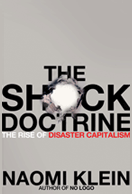The Shock Doctrine

US Extends Blackwater's Iraq Contract
Matthew Lee, Associated Press, September 2, 2009
"State Department officials said Wednesday they have extended a contract with a subsidiary of the security firm once known as Blackwater USA despite the fact the company is not allowed to work in the country.
"Three officials said the contract with Presidential Airways to provide air support for U.S. diplomats was temporarily extended because the firm chosen to replace it is not yet ready to take over. The contract was due to expire on Sept. 3 and be taken over a day later by Dyncorp International....
"The State Department had informed Blackwater in January that it would not renew its contracts to provide security for U.S. diplomats in Iraq because of the Iraqi government's refusal to grant it an operating license. The Presidential Airways contract was the last of those contracts to expire. Blackwater guards stopped protecting American diplomats in al Hillah, Najaf and Karbala, all south of Baghdad, in August."
Contractors in Afghanistan Outnumber Troops
Steven Aftergood , Federation of American Scientists' Secrecy News blog, September 1, 2009
"There are more Department of Defense contractors in Afghanistan today than there are uniformed U.S. military personnel, according to a new report from the Congressional Research Service. Not only that, the ratio of contractors to troops in Afghanistan is higher than in any prior military engagement in U.S. history.
"'As of March 2009, there were 68,197 DOD contractors in Afghanistan, compared to 52,300 uniformed personnel. Contractors made up 57% of DOD’s workforce in Afghanistan. This apparently represented the highest recorded percentage of contractors used by DOD in any conflict in the history of the United States,' the CRS report said. A copy of the report was obtained by Secrecy News."
Read the full CRS report, "Department of Defense Contractors in Iraq and Afghanistan: Background and Analysis."
ArmorGroup Guards Mistreated by Supervisors in Afghanistan
Richard Lardner, Associated Press, September 1, 2009
"[ArmorGroup] guards hired by the State Department to protect diplomats and staff at the U.S. Embassy in Afghanistan live and work in a 'Lord of the Flies' environment in which they are subjected to hazing and other inappropriate behavior by supervisors, a government oversight group charged Tuesday.
"One e-mail from a guard describes lurid conditions at Camp Sullivan, the guards' quarters a few miles from the embassy. The message described scenes of abuse including guards and supervisors urinating on people and 'threats and intimidation from those leaders participating in this activity.'
"Photographs show guards and supervisors in various stages of nudity at parties that took place near the housing of other supervisors.
Multiple guards say these conditions have created a 'climate of fear and coercion.' Those who refuse to participate are often ridiculed, humiliated or even fired, they contended."
Wall Street Stealth Lobby Defends $35 Billion Derivatives Haul
Christine Harper, Matthew Leising and Shannon Harrington, Bloomberg News, August 31, 2009
"Wall Street is suiting up for a battle to protect one of its richest fiefdoms, the $592 trillion over-the-counter derivatives market that is facing the biggest overhaul since its creation 30 years ago.
"Five U.S. commercial banks, including JPMorgan Chase & Co., Goldman Sachs Group Inc. and Bank of America Corp., are on track to earn more than $35 billion this year trading unregulated derivatives contracts. At stake is how much of that business they and other dealers will be able to keep....
"The Washington fight, conducted mostly behind closed doors, has been overshadowed by the noisy debate over health care. That’s fine with investment bankers, who for years quietly wielded their financial and lobbying clout on Capitol Hill to kill efforts to regulate derivatives. This time could be different. The reason: widespread public and Congressional anger over the role derivatives such as credit-default swaps played in the worst financial crisis since the Great Depression."
Banks 'Too Big to Fail' Have Grown Even Bigger
David Cho, Washington Post, August 28, 2009
"The crisis may be turning out very well for many of the behemoths that dominate U.S. finance. A series of federally arranged mergers safely landed troubled banks on the decks of more stable firms. And it allowed the survivors to emerge from the turmoil with strengthened market positions, giving them even greater control over consumer lending and more potential to profit.
"J.P. Morgan Chase, an amalgam of some of Wall Street's most storied institutions, now holds more than $1 of every $10 on deposit in this country. So does Bank of America, scarred by its acquisition of Merrill Lynch and partly government-owned as a result of the crisis, as does Wells Fargo, the biggest West Coast bank. Those three banks, plus government-rescued and -owned Citigroup, now issue one of every two mortgages and about two of every three credit cards, federal data show....
"The worry for consumers is that the bailouts skewed the financial industry in favor of the big and powerful. Fresh data from the FDIC show that big banks have the ability to borrow more cheaply than their peers because creditors assume these large companies are not at risk of failing. That imbalance could eventually squeeze out smaller competitors. Already, consumers are seeing fewer choices and higher prices for financial services, some senior government officials warn."
Obama Will Officially Continue Renditions
David Johnston, New York Times, August 25, 2009
"The Obama administration will continue the Bush administration’s practice of sending terrorism suspects to third countries for detention and interrogation, but pledges to closely monitor their treatment to ensure that they are not tortured, administration officials said Monday.
"Human rights advocates condemned the decision, saying that continuing the practice, known as rendition, would still allow the transfer of prisoners to countries with a history of torture. They said that promises from other countries of humane treatment, called “diplomatic assurances,” were no protection against abuse....
"The announcement, by President Obama’s Interrogation and Transfer Policy Task Force, seemed intended in part to offset the impact of the release on Monday of a long-withheld report by the C.I.A. inspector general, written in 2004, that offered new details about the brutal tactics used by the C.I.A. in interrogating terrorism detainees."
Wall Street Repackages Toxic Debt (Again)
Matt Apuzzo, Associated Press, August 24, 2009
"Wall Street may have discovered a way out from under the bad debt and risky mortgages that have clogged the financial markets. The would-be solution probably sounds familiar: It's a lot like what got banks in trouble in the first place.
"In recent months investment banks have been repackaging old mortgage securities and offering to sell them as new products, a plan that's nearly identical to the complicated investment packages at the heart of the market's collapse....
"In recent months, banks have tiptoed toward a possible solution, one in which the really good bonds get bundled with some not-quite-so-good bonds. Banks sweeten the deal for investors and, voila, the newly repackaged bonds receive AAA ratings, a stamp of approval that means they're the safest investment you can buy. 'You've now taken what was an A-rated security and made it eligible for AAA treatment,' said Richard Reilly, a partner with White & Case in New York."
C.I.A. Sought Blackwater’s Help in Plan to Kill Al Qaeda Operatives
Mark Mazzetti, New York Times, August 20, 2009
"The Central Intelligence Agency in 2004 hired outside contractors from the private security contractor Blackwater USA as part of a secret program to locate and assassinate top operatives of Al Qaeda, according to current and former government officials.
"Executives from Blackwater, which has generated controversy because of its aggressive tactics in Iraq, helped the spy agency with planning, training and surveillance. The C.I.A. spent several million dollars on the program, which did not capture or kill any terrorist suspects....
"It is unclear whether the C.I.A. had planned to use the contractors to capture or kill Qaeda operatives, or just to help with training and surveillance. American spy agencies have in recent years outsourced some highly controversial work, including the interrogation of prisoners. But government officials said that bringing outsiders into a program with lethal authority raised deep concerns about accountability in covert operations.
Officials said that the C.I.A. did not have a formal contract with Blackwater for this program but instead had individual agreements with top company officials, including the founder, Erik D. Prince, a politically connected former member of the Navy Seals and the heir to a family fortune."
The Health Insurers Have Already Won
Chad Terhune and Keith Epstein, Business Week, August 6, 2009
"As the health reform fight shifts this month from a vacationing Washington to congressional districts and local airwaves around the country, much more of the battle than most people realize is already over. The likely victors are insurance giants such as UnitedHealth Group (UNH), Aetna (AET), and WellPoint (WLP). The carriers have succeeded in redefining the terms of the reform debate to such a degree that no matter what specifics emerge in the voluminous bill Congress may send to President Obama this fall, the insurance industry will emerge more profitable. Health reform could come with a $1 trillion price tag over the next decade, and it may complicate matters for some large employers. But insurance CEOs ought to be smiling....
"The industry has already accomplished its main goal of at least curbing, and maybe blocking altogether, any new publicly administered insurance program that could grab market share from the corporations that dominate the business. UnitedHealth has distinguished itself by more deftly and aggressively feeding sophisticated pricing and actuarial data to information-starved congressional staff members. With its rivals, the carrier has also achieved a secondary aim of constraining the new benefits that will become available to tens of millions of people who are currently uninsured. That will make the new customers more lucrative to the industry."
Big Banks Marketing Risky Lending Practices
Jessica Silver-Greenberg, Theo Francis and Ben Levisohn, Business Week, August 5, 2009
"In recent months such big banks as Bank of America (BAC), Citigroup (C), and JPMorgan Chase (JPM) have rolled out newfangled corporate credit lines tied to complicated and volatile derivatives. Others, including Wells Fargo (WFC) and Fifth Third (FITB), are offering payday-loan programs aimed at cash-strapped consumers. Still others are marketing new, potentially risky 'structured notes' to small investors....
"Some of Wall Street's latest innovations give reason for pause. Consider a trend in business loans. Lenders typically tie corporate credit lines to short-term interest rates. But now Citi, JPMorgan Chase, and BofA, among others, are linking credit lines both to short-term rates and credit default swaps (CDSs), the volatile and complicated derivatives that are supposed to act as "insurance" by paying off the owners if a company defaults on its debt. JPMorgan, BofA, and Citi declined to comment.
"In these new arrangements, when the price of the CDS rises—generally a sign the market thinks the company's health is deteriorating—the cost of the loan increases, too. The result: The weaker the company, the higher the interest rates it must pay, which hurts the company further.
"The lenders stress that the new products give them extra protection against default. But for companies, the opposite may be true. Managers now must deal with two layers of volatility—both short-term interest rates and credit default swaps, whose prices can spike for reasons outside their control."















